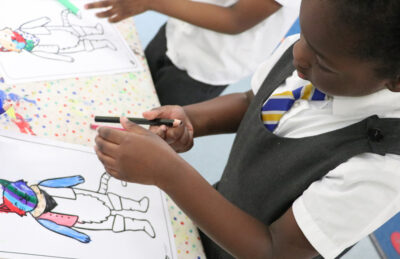Statutory Frameworks
Early Years (Nursery and Reception) 3 – 5 years of age
As required, the school follows the Early Years Statutory Framework for pupils in Nursery and Reception (Early Years Foundation Stage). There are seven areas of learning, that chime with eleven of the thirteen subjects that children at our school enjoy from the year they turn six years of age – Y1.
The areas are: communication and language, physical development and personal, social and emotional development and in addition – literacy, mathematics, understanding the world and expressive arts and design.
The areas are interconnected and each is important.
Key stage 1 (KS1) 5 – 7 years of age;
and, Key stage 2 (LKS2 and UKS2) 7 – 11 years of age.
At St. Bede’s, we follow the new National Curriculum Framework (Y1 – Y6) 2014, a copy of which is available below.
Every school must provide a curriculum which is balanced and broadly based and which:
- promotes the spiritual, moral, cultural, mental and physical development of pupils at the school;
- and, prepares pupils for the opportunities, responsibilities and experiences of later life
 The school curriculum comprises all learning and other experiences that each school plans for it’s pupils. Every school must follow the National Curriculum but the National Curriculum forms only one part of the school curriculum for the education of every child; it is organised on the basis of twelve subjects, classified as core and other foundation subjects.
The school curriculum comprises all learning and other experiences that each school plans for it’s pupils. Every school must follow the National Curriculum but the National Curriculum forms only one part of the school curriculum for the education of every child; it is organised on the basis of twelve subjects, classified as core and other foundation subjects.
There is time and space in the school day and in each week, term and year to go beyond the national curriculum specifications. The National Curriculum provides an outline of core knowledge around which exciting and stimulating lessons can develop pupils’ knowledge, understanding and skills as part of the wider school curriculum.
All schools should make provision for personal, social, health and economic education (PSHE) drawing on good practice. Schools are also free to include other subjects or topics of their choice in planning and designing their own broad and balanced programme of education. The school curriculum by subject and academic year is published online.
Curriculum Drivers
Our curriculum is driven by three distinctive things.
In what we choose to emphasise to our children, we are driven by three things:
- the ethnic and cultural diversity of our community;
- the disadvantaged start of the majority of our children;
- our local area’s story.
